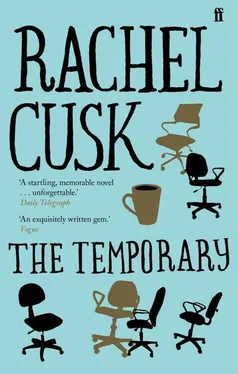Rachel Cusk - The Temporary
Здесь есть возможность читать онлайн «Rachel Cusk - The Temporary» весь текст электронной книги совершенно бесплатно (целиком полную версию без сокращений). В некоторых случаях можно слушать аудио, скачать через торрент в формате fb2 и присутствует краткое содержание. Год выпуска: 2013, Издательство: Faber & Faber, Жанр: Современная проза, на английском языке. Описание произведения, (предисловие) а так же отзывы посетителей доступны на портале библиотеки ЛибКат.
- Название:The Temporary
- Автор:
- Издательство:Faber & Faber
- Жанр:
- Год:2013
- ISBN:нет данных
- Рейтинг книги:5 / 5. Голосов: 1
-
Избранное:Добавить в избранное
- Отзывы:
-
Ваша оценка:
- 100
- 1
- 2
- 3
- 4
- 5
The Temporary: краткое содержание, описание и аннотация
Предлагаем к чтению аннотацию, описание, краткое содержание или предисловие (зависит от того, что написал сам автор книги «The Temporary»). Если вы не нашли необходимую информацию о книге — напишите в комментариях, мы постараемся отыскать её.
The Temporary — читать онлайн бесплатно полную книгу (весь текст) целиком
Ниже представлен текст книги, разбитый по страницам. Система сохранения места последней прочитанной страницы, позволяет с удобством читать онлайн бесплатно книгу «The Temporary», без необходимости каждый раз заново искать на чём Вы остановились. Поставьте закладку, и сможете в любой момент перейти на страницу, на которой закончили чтение.
Интервал:
Закладка:
He had stayed gradually later at the office every evening, often achieving little but a pleasant, unimplicated solitude as darkness fell beyond the windows, and the freer nature of his journey home once the clamouring rush-hour crowds had dispersed permitted him to see himself more clearly than he had for weeks. Normally recalcitrant in matters of social contact, he had recently telephoned one or two flagging friends and had spent enjoyable evenings in the pub rejuvenating their interest. His later hours at the office meant that he could travel directly to these assignations after work, and he had spent little time alone at his flat. Coming home and going directly to bed, he would occasionally feel a mild and inappropriate guilt, as if he were attempting to smuggle himself into his room unseen by some vigilant authority. It seemed then, especially if he returned in a state of drunkenness, that his flat had allied itself with Francine and was awaiting him accusatorily. In those muddled hours he had even felt once or twice as if he missed her.
Nevertheless, her telephone call late on Thursday evening had still taken him unpleasantly by surprise, particularly as his presence at home had failed to represent the trend of his many recent absences. Being found thus, he had suddenly felt unkind for the fact that he hadn’t communicated to her his change of heart. She had sounded different to him on the telephone, her voice spare with intent and acceptance, which informed him beyond doubt that at least she had read his misconduct correctly and was demanding a meeting merely to finalize its terms. She had wanted to meet the next evening, and Ralph, glad again to have reinforced his life with activity and thus protected himself from things he didn’t want to do, had said that he couldn’t.
‘Why not?’
‘I’m busy. I’m going out with some friends.’
‘You’ll have to tell them you can’t come.’
‘I can’t do that,’ said Ralph gently. The swingeing ferocity of her demands, in trying to grip him, merely knocked him further from acquiescence. ‘It’s too little notice. It’s all been arranged.’
He had insisted on meeting her instead on Saturday afternoon, convinced by a sudden access of inherited wisdom that, while the inception of such romances belonged to the soft, veiling influence of the night, their termination was best performed in broad daylight. She had reluctantly agreed and the conversation came swiftly to an end.
Thinking about it now Ralph felt inexplicably sad, and a sudden consciousness of his loneliness in the empty office worsened his condition. Even through the spreading miasma of emotion, however, he could still recognize that his mistake had been at the beginning, in taking up with Francine at all, and that the palliative for his pains — the sweet oblivion of inaction, the peculiar dreaminess of lies; in short, the ease of doing nothing — which was at that moment suggesting itself would inflame rather than cure them. Once he had finished things for good, he would feel better. He did feel better, even with the flogged form of the dreadful past few weeks still on his hands. Soon he would be rid of it. The thought that he had in some way duped Francine dimmed slightly the honest allure of his future freedom. She had sounded so hurt on the telephone. It would be even worse on Saturday. For a moment he ached sentimentally for her, and then hardened as he remembered how he had learned to inflict pain — from experience! Everyone got hurt at some point. Why should she be spared? He looked at his watch and saw that half an hour had passed. He was late. He put on his coat and left the office.
It was past midnight by the time he got home, and as he unlocked the door to his flat he had an odd sense of a menacing delegation rising to greet him from the dark, a group of troubles whom he had kept waiting during his forgetful hours away. He was tired and he carried his sense of unease with him to bed, hoping to dissolve it with sleep. As he lay down, however, a horrible alertness visited him: every thought in his head seemed to ignite and rage until his mind was a furnace, and he lay awake in its uncomfortable heat, often unsure whether he was conscious or dreaming. He hadn’t lain thus since he was a child, and he was surprised to see how much shorter the night was now, its later hours, which once had filled him with terror, made familiar to him at parties and in late-night conversations. When the clock beside his bed began to approach three, he felt the swelling tide of sleep finally rise in him, and when he awoke it was almost with a feeling of excitement for the day ahead. As he bathed and dressed, the false promise of his arrangement with Francine continued to trick him, sending stabs of inarticulate anticipation through his stomach from which, seconds later, came more conscious trickles of dread. It was still too early to leave by the time he had readied himself, and he sat aimlessly in the sitting-room with a book, as if he were waiting at an airport. He hadn’t wanted Francine to come to the flat, and the ethereal but none the less obstructive presence of Janice had ruled out a visit to West Hampstead, so in the end Ralph had suggested a walk in Regent’s Park; a place to which he rarely went, but whose foreignness was, he felt, countermanded by the advantages of the open air. It was the least intimate of settings, and the possibilities for escape from it were unlimited. He had calculated it would take him fifteen minutes to make the journey, and he ruled his impulses sternly until the appointed time for departure so as to blockade all possible diversions.
He saw her as he came up Prince Albert Road, standing on the pavement by the entrance to the Outer Circle beside a pedestrian crossing. She was looking across the road, her posture held in that attitude of vacant stillness which he could never decide signified poise or inertia, and as he approached he saw several cars slow down to permit her to cross, their headlights empty as leering eyes, and then buck irritably on as she remained immobile. He proceeded towards the pedestrian crossing himself, but a sudden stream of traffic prevented him from going over. As he stood there stupidly, she caught sight of him and he saw her face change oddly with a kind of backstage movement, like a mask behind which a living face had briefly appeared. Seconds later she looked away again, as if pretending she hadn’t seen him, and as he waited to cross the road he found himself struck again by her beauty, by its precarious quality of aloofness which could move him either to worship or indifference. From a distance he noticed a new fragility in her features, accentuated by the black coat which she had wrapped tightly around her, pinning it with self-embracing arms. He had remembered her as robust and fully coloured, a dominating presence in which only the most obvious things survived, while paler, more delicate effects were lost. Even though only a week had passed since last he had seen her, her face seemed thin and translucent, and as he looked he saw something in it, some evidence of emotion, which hazily informed him that she had changed.
‘Just coming!’ he shouted awkwardly over the noise of passing cars, as he lunged forward into the road with one cautionary hand raised like a policeman. ‘Sorry about that,’ he said, reaching the other side. He could hear himself panting, although the exercise had been mild.
‘Shall we go?’ said Francine quietly, turning to face the park. He glanced at her and saw the perilous thinness of her neck, from which it appeared her bone-china skull might at any moment tumble.
‘Right, yes,’ he replied, setting off exaggeratedly so that she would know which way they were going. ‘Sorry, that was my invisible man routine again back there.’ He laughed, but the sound came back unabsorbed from her unresponding face. ‘How are you?’
Читать дальшеИнтервал:
Закладка:
Похожие книги на «The Temporary»
Представляем Вашему вниманию похожие книги на «The Temporary» списком для выбора. Мы отобрали схожую по названию и смыслу литературу в надежде предоставить читателям больше вариантов отыскать новые, интересные, ещё непрочитанные произведения.
Обсуждение, отзывы о книге «The Temporary» и просто собственные мнения читателей. Оставьте ваши комментарии, напишите, что Вы думаете о произведении, его смысле или главных героях. Укажите что конкретно понравилось, а что нет, и почему Вы так считаете.












